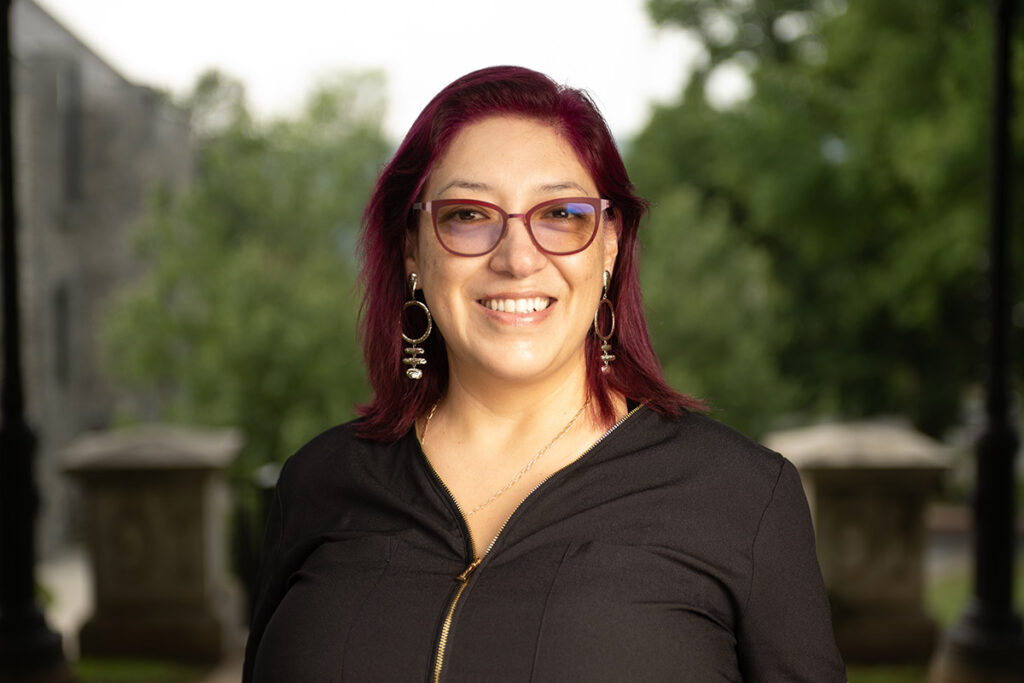Highlighting our faculty
- Faculty at Lafayette College are renowned leaders in their respective fields, exceptional teachers and dedicated mentors. Read more about our faculty.
Meet Carmen Valdivia, assistant professor of languages and literary studies

What I study and why: Contemporary Latin American cultural production with special attention to Indigenous women’s issues and representation in the Andean area. My manuscript-in-progress, Mercurial Coloniality: Gendered Indigeneity, Extractivism and Cultural Representation, examines mediatized representation of Indigenous women in film and mainstream media, and auto representation in participatory audio video narratives, a collaborative digital project with Indigenous women leaders from the National Organization of Andean and Amazonian Indigenous Women of Peru (ONAMIAP). This project considers two interrelated questions: first, the ways in which the coloniality of mestizaje articulate Peruvian identity in its affinity for whiteness, contested relation with Indigeneity, and its role in Indigenous women’s historical invisibility and silence; second, how organized Indigenous women contest the coloniality of power undergirding the nation-state extractive culture and economy. My second project examines audiovisual cultural production by young Indigenous women in urban settings and their use of social media as a political tool and a space for cultural sovereignty. My passion for teaching and research stems from my experience as a young adult undocumented immigrant to the U.S. seeking cultural understanding and a sense of belonging. Through the study of culture and language, I tempered my foundations and realigned my purpose in my new society. Education, echoing bell hooks, is my practice of freedom. My transnational immigrant experience has provided me with a comparative understanding of Peruvian culture and society in regard to gendered and racialized representations of Indigenous women and peoples. Forefronting race and gender as indivisible analytical categories illuminates issues of persisting inequality, political instability, and gender violence decades after the Peruvian Political Armed Conflict (1980-2000).
What I will be teaching in the fall: Indigenous Philosophy and Cultural Production (SPAN 345) and Spanish for Heritage Speakers (SPAN 215)
What students can expect from me: Students can expect a learning environment that nurtures critical thinking, collaboration, and creativity. In both my content and language courses, students are immersed in an intercultural experience I have been honing since my days as a professional tour guide and tutor in Cusco, Peru. Through authentic textual and visual narratives, students explore different perspectives, paying attention to the linguistic strategies, artistic sensibilities, and the context in which these works were produced.
I’m excited to be here because: It is with great enthusiasm that I join Lafayette College, an institution that resonates with my academic and personal interests. I come from an interdisciplinary formation on Latin American, Indigenous and Native American studies, and have mentoring and service experience as the Davis Feminist Film Festival director, and the AB540 and Undocumented Student Center (AB540 & USC) education coordinator at UC Davis. At Lafayette, I have encountered colleagues, students, and a community eager to engage in urgent conversations, and cannot wait to tune myself to the heartbeat of Easton and the greater community.
Getting to know me: Dancing and working out are a must in my daily routine. I used to sing in a mariachi band in California and hope to soon find a new musical team in Pennsylvania!
Continue reading to meet more of Lafayette’s newest faculty members.